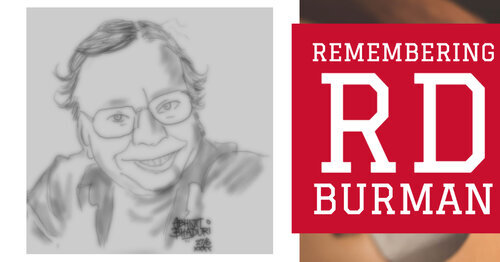RD Burman (27 June 1939 – 4 January 1994) is an influencer in Bollywood even today long after he is gone. Reality shows dedicate episodes to RD, channels organize special RD Music shows, and his songs continue to be referenced in recent movies like Aisha, Tamanchey, Race, etc. TV serials continue to use cover versions of his songs, not to mention the numerous “remixes” of his songs.
Yet the same RD had long spells towards the end when he was without work. Success and failure perhaps have to be measured beyond the life span of an artiste. Filmmaker Brahmanand Siingh made a really insightful film called Pancham Unmixed about RD Burman. The film is a seamless narrative about this music composer who made almost 300 albums in his lifetime. Brahmanand Siingh is back with a much awaited sequel called “Knowing Pancham” to coincide with RD’s birthday. I caught up with Brahma to know what he discovered about RD in the process of making this film.
Q: What was it like for musicians to be in a studio with RD? Was he a task master?
Brahma: RD always maintained that he had to be in a good mood even while creating melancholic melodies. He loved what he was doing, mixed well with his musicians, made friends easily, and had a keen eye for talent and then tremendous respect for the individual. But behind this seemingly all fun environment was sheer hard-work, discipline and dedication. Melodies were being created by the minute in the music room and songs / scores recorded every day in the studios, without fail. SD had planted this thought in RD’s mind at a very young age that he should compose 4-5 tunes every day even when he did not have work. By the time RD recuperated from his heart surgery, he had 100’s of tunes ready. Ashaji and Gulzar Sahab talk about making of the song Mera Kuchh Saamaan from the film Ijaazat. Because of the words being so conversational, RD refused to put them to music. Then Ashaji hummed a couple of words and RD built on that and composed the melody in just a few minutes. The song is very complicated in its orchestration and has layers of sounds besides having the melody wrapped around conversational lyrics. So the final version that we hear, would have taken several days of “nurturing”, as RD would put it.
Q: Pancham blended western music seamlessly with Indian classical and folk. Did that alienate him from the traditionalists?
Brahma: I am sure he did! But though Pancham is known to have brought in western influences, foot-tapping club numbers and mad compositions, one should not forget that he had a solid background of Indian Classical and Folk music. Every composition of his had a strong element of melody in it right up to the antaras and interludes. Contrary to popular belief, he actually won the admiration of the senior stalwarts who were not easy to please. Legendary Anil Biswas in a radio interview praised RD for his approach to music and made a statement that, “had RD not been younger to me, I would have touched his feet!” Jaikishen was there to bless RD when the 1st song of Teesri Manzil was recorded. Manna De never missed an opportunity to tell SD that he was a fan of Pancham. In a reality show on television, when OP Nayyar had declared himself to be a fan of RD. . Sajjad Hussain, composer of yesteryears considered SD Burman’s Megha Chhaye and RD’s Raina Beeti Jaye as two gems of film music based on Indian Classical Music. Another good example is the song “Ek Chatur Naar” which is a light-hearted musical competition but never does it lose its roots in Indian Classical Music, both Carnatic and Hindustani.https://youtu.be/9HwrMGpFaik



Leave a Reply